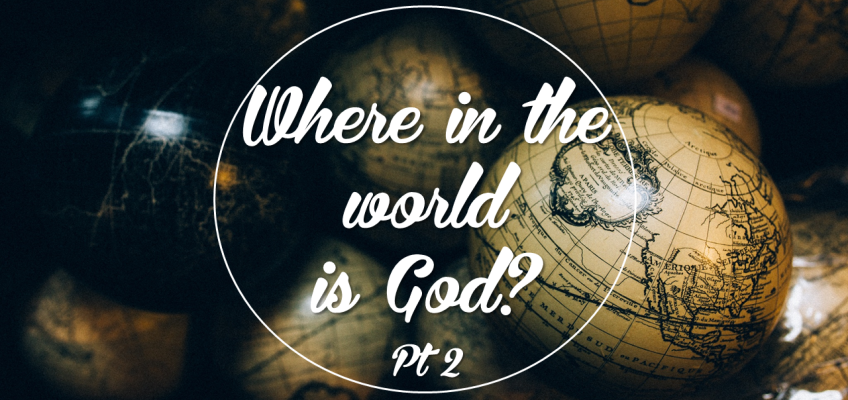Last week I started a discussion on the issue of pain and suffering in the world. The questions I’m trying to answer here are things we’ve all thought at one point or another: “Where is God during our suffering?” “Does God even care that I suffer?” “Why is there pain and suffering in the world?” If you missed last week’s blog, you can click here to catch it, because we’re jumping right in to part 2…
4. The Meaning of Life is NOT Happiness
This may come as a shock to you, and it’s probably a bummer, but it’s true. And the sooner we come to grips with that, the better our lives will be. It’s easy to think in our culture today that we are the center of the universe. Social MEdia is all about ME (not me, specifically, but you get what I’m saying). And how many reality TV shows about obscure characters or washed up celebrities do we really need? Now, I’ll admit, I use social media and I’ve watched my fair share of reality TV, which proves that no one is immune.
But as much as ‘experts’ and everyone else today would say that life is all about us and life is all about what makes you happy, it’s just really not the case.
There’s an old Church document called the Westminster Shorter Catechism which is basically a fundamental statement of faith from 1647 (see, I told you it was old). It is set up in a question-answer format and the very first line of this Q&A is: “What is the chief end of man?” Basically, it is asking, “What is the meaning of life?” The answer: “To glorify God and enjoy him forever.”
Notice how there’s nothing in there about if you feel like it.
Or if you have time.
Or if it makes you happy.
In 1967, a 17-year-old young woman named Joni Eareckson was paralyzed from the neck down in a diving accident. She was full of hope and promise for the future and that now all seemed lost. In a book she wrote about her life and this experience she says she desperately wanted to commit suicide and was frustrated that she could not because of her quadriplegic condition which caused more pain and depression. Then later in the book, she writes what she eventually learned about life from this: “God cares most – not about making us comfortable – but about teaching us to hate our sins, grow up spiritually, and love him. To do this, he gives us salvation’s benefits only gradually, sometimes painfully gradually. In other words, he lets us continue to feel much of sin’s sting while we’re headed for heaven…where at last, every sorrow we taste will one day prove to be the best possible thing that could have happened.”
Now, it’s one thing for me to talk about pain and suffering, since to this point my life has been fairly normal. But for this woman who faced these circumstances to say that is a different thing entirely. Joni Eareckson Tada (yes, she’s married now) has lived her life with that attitude and has accomplished more than most ever will. During her two year rehab, she learned to paint by holding the paintbrush in her teeth and has become world-famous for her amazing artwork. She has written over 50 books, has visited 47 countries, has received numerous awards including 3 honorary doctorates, and for the past 32 years has hosted a radio program that is aired on over 1,000 outlets. She’s learned through very difficult ways that happiness is NOT the point of life.
5. God’s Purposes are Big & Eternal
This point really requires some faith on our part. We have to trust God. In Isaiah 55:8-9, God basically says, “I’m God. I’m in control. You don’t always understand what I do or why I do it because you’re not me.” We have to believe that AND be ok with that. That’s faith.
The whole point of the Old Testament book of Job is that God knows better than we do, that He’s been here longer than we have, and we’re not really in a position to question Him. And if we do question Him, we may not get a response. Kinda cruel, maybe, but God’s not messing around. He wants to know if we really trust him or not.
God has a plan.
We are part of that plan.
Suffering is part of that plan.
We don’t always understand every part of the plan.
But it’s ok because it’s God plan.
6. We Are Not Alone
I’ll be fairly brief with this point because it’s pretty simple.
When we suffer, God is always with us. There are a few dozen verses in the Bible about God’s faithfulness. I won’t list or link them here, but I can get you a list if you want one.
Not only is God with us through our suffering, but He has suffered as well.
Think about it: God made us to have a relationship with him, but we as the human race willfully reject God and sin. That’s pain!
And because God loved us so much, he sent His Son, Jesus, to earth.
To be murdered.
Crucified for us. Crucified by us (our sins). God thought of FUBU long before Daymond John did.
So, if anyone knows about suffering, it’s God.
7. There Is Something to be Gained from our Suffering
Since suffering and pain are universal, we shouldn’t be surprised when we suffer. And we shouldn’t ask, “Why am I suffering?” Instead, we should ask, “What can I learn & gain and how can I grow from this?”
In Philippians 3:10, Paul says his goal in life was to know Christ through his resurrection AND by participating with him in suffering. Paul understood that to truly know God and become more like Jesus, suffering would have to be involved.
Another man who knew how to keep his head up despite suffering was Horatio Spafford. You may not have heard of him, but you probably have heard (or at least heard of) a song he wrote out of his deepest pain. Here’s his story.
What will we gain from suffering? What lessons will be learn? How will we grow? Who will we encourage or impact?
I don’t know the answers to those questions. They will be different for all of us.
But there are answers to these questions.
There is a method to the madness.
There is hope in our suffering.
There is comfort in our pain.
Where in the world is God? He’s right there with you right now. Now and always. No matter what.

